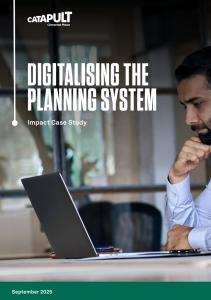Digitalising the planning system
File type: pdf
File size: 35.25Mb

As the demand for new homes, infrastructure, and sustainable development grows, the need for a more efficient, data-driven approach has never been greater.
Manual, non-standardised approaches can slow decision-making, increase costs, and make it difficult for authorities to monitor outcomes or engage effectively with the public. For applicants and planners alike, the process can be complex and time-consuming which in turn creates barriers to growth and innovation across the sector.
“Poor data limits authorities' abilities to monitor outcomes effectively and share insights with the public which reduces transparency”Steve Quartermain CBE, former Chief Planner at MHCLG, speaking on Connected Places Catapult podcast in 2022
By championing new technologies and shared data standards, we are helping to streamline planning applications, reduce administrative burdens, and improve the experience for all stakeholders.
There are also digital tools like PlanX which are enabling faster, more transparent decisions, while targeted support for innovators is unlocking new opportunities for collaboration and growth.
Download the case study to discover how digital transformation is delivering real benefits for planning authorities, communities, and the built environment across the UK.

Digitalising the planning system
File type: pdf
File size: 35.25Mb

